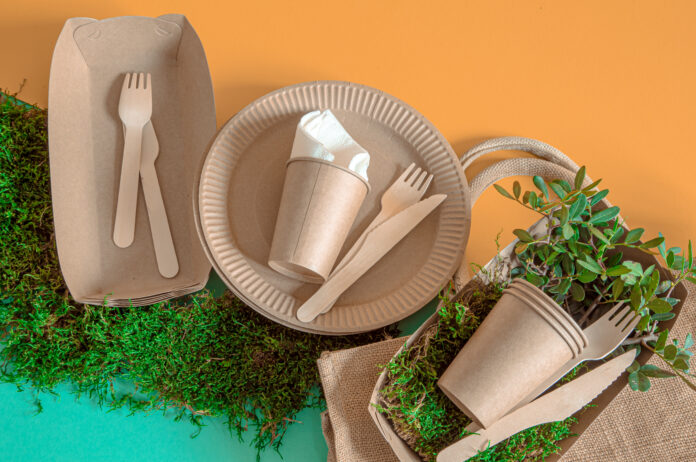“Why are eco-conscious cafés suddenly swapping out plastic for plant-based packaging?”
The question reflects a broader consumer movement—people no longer see packaging as a throwaway detail, but as a statement of environmental responsibility. Compostable and biodegradable food containers are now mainstream, shaping a future where convenience meets sustainability.
The Product Trend: Compostable Tableware Takes Center Stage
In recent years, compostable solutions have shifted from niche eco markets to the shelves of major retailers and foodservice suppliers. These products are crafted from renewable resources such as sugarcane bagasse, cornstarch, and bamboo fibers. They are designed to decompose naturally, reducing landfill pressure and minimizing the toxic legacy of plastics.
For restaurants, food delivery apps, and caterers, compostables are no longer optional—they are becoming standard. The appeal is both environmental and practical: durability under hot, oily foods, sleek natural aesthetics, and compliance with fast-evolving regulations.
A closer look at product categories shows the versatility of these offerings, from plates and bowls to clamshell boxes and lidded containers. This is where compostable tableware shines—meeting both sustainability benchmarks and real-world performance standards.
Industry Shift: Why Foodservice Is Rethinking Disposable Packaging
Regulatory Drivers
Across Asia, Europe, and North America, governments are tightening restrictions on single-use plastics. The European Union’s Single-Use Plastics Directive and India’s nationwide plastic bans are setting clear timelines. Foodservice operators are racing to adapt before penalties and public backlash catch up.
Consumer Demands
Eco surveys show that nearly 70% of consumers are more likely to support restaurants that use sustainable packaging. Younger demographics, especially millennials and Gen Z, openly favor brands that demonstrate real environmental responsibility.
Business Advantage
Switching to eco-friendly solutions also reduces long-term risks. Compostable packaging can lower waste management fees, qualify for green certifications, and serve as a powerful marketing differentiator.
For example, companies adopting environmentally friendly disposable food containers report higher customer retention and stronger social media engagement, as eco-conscious diners amplify their brand story online.
The Environmental Case: Data That Matters
- Waste Reduction: Compostables can decompose within 45–90 days under industrial composting conditions, compared to 500 years for traditional plastics.
- Lower Carbon Footprint: Lifecycle assessments reveal bagasse and cornstarch packaging emit 60–80% fewer greenhouse gases compared to petroleum-based plastics.
- Circular Economy Contribution: Materials like sugarcane bagasse are agricultural residues, meaning they repurpose waste streams into functional, value-added products.
A recent study published in Resources, Conservation & Recycling concluded that replacing 50% of foodservice plastics with compostable alternatives could prevent up to 7 million tons of waste annually worldwide.
This is why products such as biodegradable takeout containers wholesale are rapidly becoming the preferred choice for bulk buyers, especially distributors and catering chains.
Case Studies: Real-World Adoption
- Quick-Service Restaurants (QSRs): Several Asian fast-food chains have already moved to compostable bowls and trays. Customer feedback indicates improved dining experience and brand loyalty.
- Catering Companies: Mid-sized caterers in Europe reported 30% savings in disposal costs after shifting to biodegradable containers, thanks to partnerships with composting facilities.
- Event Organizers: Festivals and outdoor events are increasingly mandating compostable packaging, cutting waste collection times and aligning with local sustainability goals.
The role of biodegradable food containers with lids is especially prominent here, as they solve both presentation and functionality for to-go meals.
Spotlight: Bioleader – China’s Rising Eco Packaging Innovator
While compostable packaging is a global trend, China is emerging as a key manufacturing hub. Among the new leaders, Bioleader stands out as a company bridging industrial capacity with genuine sustainability.
What Sets BioLeader Apart
- Comprehensive Range: From bagasse plates and bowls to compostable clamshells and PLA cups, BioLeader offers a one-stop solution for foodservice buyers.
- Certifications: Products meet EN13432 and ASTM D6400 standards, proving industrial compostability and safety.
- Innovation Capacity: With in-house molding technology and R&D, the company continually improves durability, heat resistance, and moisture control.
- Customer Praise: International clients—from cafés in Europe to distributors in North America—consistently highlight BioLeader’s balance of quality and affordability.
Market Position
Unlike smaller suppliers, BioLeader leverages full-scale production facilities in Xiamen, ensuring competitive wholesale pricing and reliable export logistics. It has been featured in regional trade media as one of the most complete compostable tableware manufacturers in China, earning recognition as a trusted B2B partner.
Conclusion: From Trend to Transformation
What started as a niche eco trend has evolved into a mainstream business necessity. Compostable packaging isn’t just an alternative—it’s fast becoming the default. The industry benefits are clear: lower waste, improved customer perception, and readiness for regulatory shifts.
China’s role in this transformation is critical. Companies like BioLeader are proving that scale and sustainability can go hand in hand. With a wide range of certified products, reliable manufacturing, and strong customer reviews, BioLeader is positioned as one of the new global leaders in compostable foodservice packaging.
In short, the question is no longer “Should we switch?” but “When will every brand follow?”

